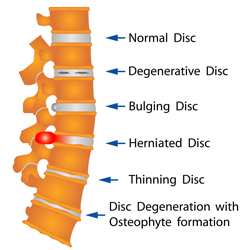Spine and Neck Herniated Discs

Disks are soft, rubbery pads found between the hard bones or vertebrae of the spinal column. They are composed of a thick ring of cartilage (annulus) with a nucleus made of a gel-like substance. Disks in the neck are the same composition, but smaller. Disks allow the back to flex or bend and act as shock absorbers. A herniated disc is a common source of back or neck pain. A disc herniates or ruptures when part of the gel in the nucleus pushes through the outer edge of the disc and back toward the spinal canal, putting pressure on sensitive nerves.
Herniated disks in the back can result in pain, numbness or weakness in one or both legs. A herniated disk can cause sciatica in the lower back, a painful condition that radiates down the leg and may impair movement. When a disk herniates in the neck, it puts pressure on the nerve and causes pain in the muscles between the neck and shoulder (trapezius muscles) and may shoot down the arm. Symptoms include burning pain in the neck, shoulder or arm and weakness or numbness in the arm.
In children and young adults, disks have high water content. As people age, the water content in the disks decreases and the discs become less flexible. The disks begin to shrink and the spaces between the vertebrae get narrower. Conditions that can weaken the disk include improper lifting, smoking, excess weight, and strenuous work or sports activities. To determine whether a DOC guest has a herniated disk, the orthopedist will discuss medical history. A physical examination helps to determine which nerve roots are affected and an MRI scan provides clear images of soft tissues like discs to confirm a diagnosis of a herniated disk.
Nonsurgical treatment is effective in treating the symptoms of herniated disks for most guests, including rest, anti-inflammatory medications and cold compresses. Gentle exercises and proper posture strengthen the back muscles and may help to avoid future episodes. If nonsurgical treatment fails, epidural injections of a cortisone-like drug may lessen nerve irritation and allow more effective participation in DOC physical therapy. Only a small percentage of patients with disk herniations require surgery. Discuss options with the DOC orthopedic spine surgeon. To learn more about neck and spine conditions treated by DOC, please visit our services page here.
For more information on the cost of care, click here.




